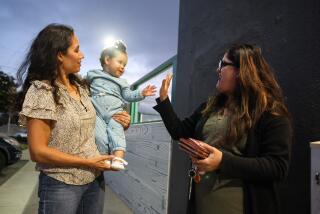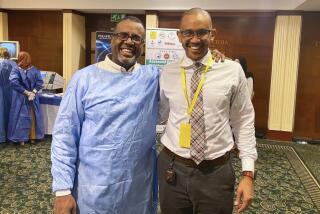Immigrant Doctors Finding Comfy Home in the Country
- Share via
LA HARPE, Ill. — Time caught up with La Harpe last year when the old country doctor retired and folks reluctantly sought health care from strangers in distant cities.
But then town leaders recruited a new doctor with warmth and charm reminiscent of the man he replaced. The only difference: The newcomer was a Vietnamese immigrant.
In recent years immigrant doctors have set up practices in thousands of small towns like La Harpe, taking the reins from old-timers and filling a health-care gap in rural sections of the Midwest and South.
In Illinois, an estimated half of the state’s 12,000 immigrant doctors are practicing outside the cities and suburbs. One expert says immigrants make up about 75% of the doctors in rural Michigan.
Predictably, many immigrant doctors struggle for acceptance in isolated communities where people are unfamiliar with foreign accents or the touch of a dark-skinned hand. And male doctors from the Orient and Middle East often must learn to adjust their attitudes toward women.
Yet a symbiotic bond has developed between rural America and the corps of immigrant doctors. Rural areas need affable doctors with general skills willing to forgo the cultural and economic advantages of cities. Immigrants want to practice in quiet, close-knit communities.
“We are drawn to rural areas by the obvious opportunities there, and because rural areas are not the choice of Americans,” said Dr. Kishore Thampy, an immigrant from India practicing in Dixon, Ill. His colleagues at the town’s small hospital include doctors from China and Korea.
The congressional Council on Graduate Medical Education says the number of immigrant doctors--those born and often trained overseas--has increased nationwide in the past two decades. Today, about 20% of the nation’s 600,000 physicians are immigrants.
A recent report by the council recommended slowing the influx of foreign doctors as a way to reduce what it called an oversupply of physicians. The report, now being reviewed by congressional committees and the White House, said stiffer immigrant quotas would help control health costs.
The recommendation has been criticized by Thampy, who edits a newsletter for immigrant colleagues, and experts in the doctor recruitment field. They say small rural areas need immigrants because American-born doctors will not leave the lucrative cities.
“Many of the hardest-to-fill positions are in the rural areas,” said Roger Bonds, president of a nonprofit recruitment service in Atlanta. “Western physicians tend to congregate around metro areas, but international physicians are willing to be in the rural areas.”
Even without quotas, Bonds said, prejudice controls the flow of immigrants seeking residencies at rural hospitals. Discrimination laws do not affect hospital directors during the doctor selection process, he said.
But rural communities work hard to find and keep doctors--of any heritage--willing to accept limitations such as outdated hospital equipment.
Northwest Michigan now depends on immigrant doctors; they have all but replaced Americans in many communities. Yet more are needed.
“We can’t find anybody,” said John Peterson, a doctor recruiter trying to fill four slots in Traverse City. “It’s not the pay--it’s just that it’s not metropolitan enough for most doctors.”
In La Harpe, a crowd of senior citizens and businessmen braved a snowstorm last winter for a reception where they asked Dr. Hung Nguyen to practice in town. He agreed, and now the 32-year-old doctor who fled the Vietnam War as a boy cares for former patients of 82-year-old Dr. B. I. Mueller, who delivered babies and set bones for five decades.
“It’s hard to replace somebody like Dr. Mueller,” said Connie Smith, who helped recruit the new doctor. “But Dr. Nguyen has some of the same qualities and characteristics. He takes time to visit with you and tell a story.”
More to Read
Sign up for Essential California
The most important California stories and recommendations in your inbox every morning.
You may occasionally receive promotional content from the Los Angeles Times.










